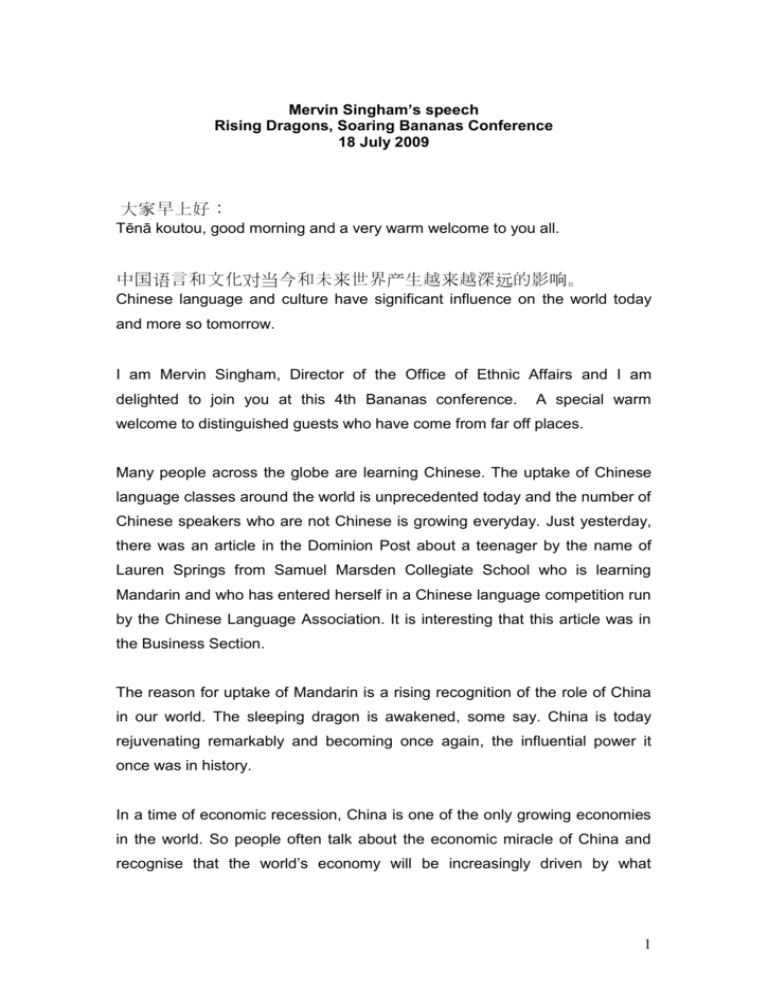Speech notes for Rising Dragons, Soaring Bananas Conference
advertisement

Mervin Singham’s speech Rising Dragons, Soaring Bananas Conference 18 July 2009 大家早上好: Tēnā koutou, good morning and a very warm welcome to you all. 中国语言和文化对当今和未来世界产生越来越深远的影响。 Chinese language and culture have significant influence on the world today and more so tomorrow. I am Mervin Singham, Director of the Office of Ethnic Affairs and I am delighted to join you at this 4th Bananas conference. A special warm welcome to distinguished guests who have come from far off places. Many people across the globe are learning Chinese. The uptake of Chinese language classes around the world is unprecedented today and the number of Chinese speakers who are not Chinese is growing everyday. Just yesterday, there was an article in the Dominion Post about a teenager by the name of Lauren Springs from Samuel Marsden Collegiate School who is learning Mandarin and who has entered herself in a Chinese language competition run by the Chinese Language Association. It is interesting that this article was in the Business Section. The reason for uptake of Mandarin is a rising recognition of the role of China in our world. The sleeping dragon is awakened, some say. China is today rejuvenating remarkably and becoming once again, the influential power it once was in history. In a time of economic recession, China is one of the only growing economies in the world. So people often talk about the economic miracle of China and recognise that the world’s economy will be increasingly driven by what 1 happens in China. Today, more than 70% of New Zealanders regard the Asian region as the most important to the country’s future. However, apart from the economy, China will also undoubtedly have a big impact on culture and values. Any growing superpower wields this potential. In years to come, we will undoubtedly witness a change in global cultures as Chinese culture and values take on more prominence. Countries that are well acquainted with China, its people and culture will undoubtedly have greater opportunities for economic, social and cultural ties with China. There is a growing recognition that the diaspora Chinese community comprise a reservoir of talents, contacts and energies that could be utilised to facilitate New Zealand’s multifaceted, complex and challenging economic relationship with China. I was reflecting on the title of this conference and my mind returned to my homeland Malaysia, a very multicultural country. Chinese Malaysians have been living in Malaysia for generations and now make up over a quarter of the population. Chinese culture and values have permeated almost every aspect of Malaysian life – from the names of busy streets in Kuala Lumpur to amazing fusion cuisine, which combined noodles with Malay spices, to strong work ethics in the pursuit of education. The Chinese are an enormous force behind Malaysia’s economic engine. Just two weeks ago, a Chinese friend of my mother by the name of Judy came to visit her daughter in Wellington. She is 69 and is fondly known as “poh-poh” by many people. We had her over for dinner at my mother’s instruction from Malaysia! She is a dynamic and energetic person full of life who is third generation Chinese. Over dinner she told us that she was running a business importing Chinese medicines to Malaysia for a growing market of people seeking natural remedies. She is also involved in frequent busy trips to China where she takes groups of people on tourism visits to the 3 River Gorge district. She tried to convince us to partake in her tourism enterprise because she understood how to do business in China and was always able to get the best deals! 2 This remarkable woman is living evidence of how cultural connections that the Chinese have with China, even after generations of being Malaysian, has added to Malaysia’s economic strength. Now looking at New Zealand - New Zealand is very different today compared to what it was a mere twenty years ago. We are a small country, but our diversity can be our strength. Almost 23 percent of people in New Zealand are born overseas, over 17 percent speak two or more languages and nearly 10% of our population is Asian. We are one of the most diverse countries in the OECD and also one of the most tolerant of diversity. We were recently voted the most peaceful country in the world by the reputable Economist magazine – something we must treasure. What wonderful diversity we already have at our fingertips! Ethnic festivals, such as Chinese New Year, are celebrated all over the country. The Chinese lantern festival is hugely popular and attracts large numbers of people who believe that Auckland is all the better for its presence. Ethnic communities have become more confident and proud of who they are in an environment in which they are a minority. We have strong foundations for relations across diverse communities. So what next? How can we make the best use of New Zealand’s growing ethnic diversity? How can we turn our growing awareness and interaction with other cultures into something that will benefit the whole country? How can we make our diversity count? I would like to put three ideas forward for the steps we must take to make our diversity yield fruit for New Zealand. These ideas form the backbone of the Office of Ethnic Affairs policy advice and community interventions. Firstly we must cherish diversity. We must truly see its value and genuinely seek to build respect for it – not tolerance but real respect. We all have a role 3 in raising awareness about the tangible value of ethnic diversity to New Zealand. Secondly, we must connect people together – create spaces and opportunities for people from diverse backgrounds to interact with each other. Thirdly, we must increase our cultural awareness so people can interact effectively with respect and appreciation of different worldviews. If we do these things smartly, we will enable people to channel their efforts constructively. We will also generate innovation, enterprise and change. Cultural awareness is like the oil that makes the wheels of multicultural societies move more smoothly. This is why the Office of Ethnic Affairs offers diversity management advice and cultural awareness training. Cultural awareness was once seen as a soft skill. Today it is regarded as essential for successful global business whether it is in the field of business, diplomatic relations or humanitarian aid. Indeed, a lack of cultural awareness about how to do business in China has been a cause of failure for businesses that have attempted to capitalise on the vast opportunities opening up there. It is when people from different backgrounds and experiences get together, that innovation is more likely to occur. We should not be concerned to disagree or have a different perspective on any given issue. Indeed it is often these differences that spark off innovation. If people all think differently, then by bouncing ideas off each other, they come up with new solutions to problems. We need more of this. We need to take advantage of all the new ideas which diversity brings. This weekend you will see many examples of how creativity is opening up new possibilities for New Zealand and the world. Now I’ve told you what I think. My challenge to you is to think about how you can play a part in maximising the benefits of your diversity. 4 Now is the time to turn our diversity into action. We must move beyond merely celebrating our cultures to actively unlocking the creative potential our diversity brings for New Zealand. This conference is a wonderful example of our new way of thinking. This conference has been getting bigger and better every year. At the last conference, there was standing room only. This is a credit to the New Zealand Chinese Association. You lead the debate on important issues for Chinese communities in New Zealand. This paves the way for other communities to mobilise themselves and do the same. You have set a shining example to many communities about the value of civic participation, and I congratulate you for this. I believe New Zealand is a unique country with equally unique opportunities. We are small and isolated but known for punching above our weight. We truly are in a position to lead the way in ensuring the tree of ethnic diversity yields a rich and bountiful harvest for everyone who lives here. Thank you and I wish all the presenters and attendees a very successful and inspiring weekend. 谢谢大家! 5






